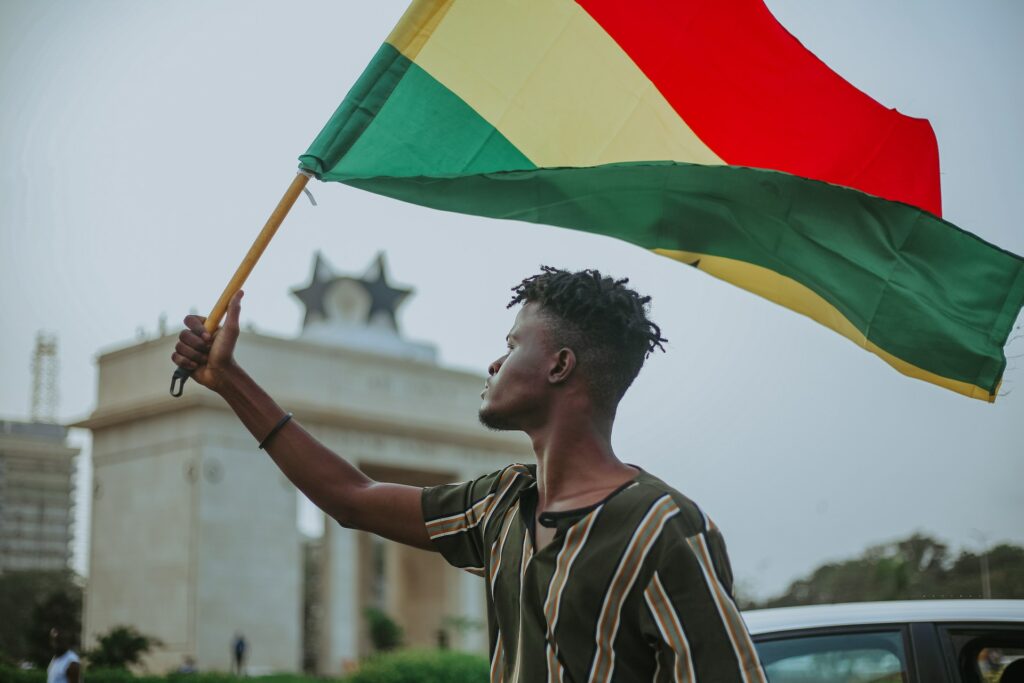Location: Old Fadama, Accra, Ghana
Main Contact for Research: Jessica Kritz (Jessica.Kritz@georgetown.edu)
Time span: 2015 – 2021
Green SDGs: 6, 11
Publication DOI: 10.1017/9781009394833
Publication Link: A short video describes the early phase of the project and an open access book explains the project in greater detail.
Partners: Accra Metropolitan Assembly, Ministry of Health, National Catholic Health Service, Catholic Sisters, Old Fadama Youth Development Association, Kayayei Youth Association
The Old Fadama informal settlement within Accra, Ghana, nicknamed “Sodom and Gomorrah” by locals, was treated as a “no-go zone” by the government. Law enforcement refused to enter the slum and government infrastructure planning did not include that geographic area, ignoring the population of almost 150,000 when allocating municipal resources. Old Fadama had virtually no water or sanitation infrastructure, which led to chronic cholera outbreaks that began in the slum and traveled throughout Accra. This led to tensions between community leaders and the municipal government, which had not kept promises about infrastructure upgrades. In 2015, there was catastrophic flooding in Old Fadama, the municipal government demolished of part of the slum encroaching on the river, an action that many residents viewed as retaliatory.
Beginning in 2015, participatory action researchers convened with stakeholders to tackle complex challenges facing the community of Old Fadama. This process created a “stakeholder platform,” a forum that allowed stakeholders to identify and prioritize community issues and develop solutions. Due to the contentious history of the government relationship with the community, a neutral facilitator and Catholic sisters were introduced to build bridges between the conflicted parties. They created an evidence-based cross-sector collaboration framework informed by survey and interview data on hundreds of participants working on sanitation. Participants identified the complex challenges of sanitation, solid waste handling, protection of vulnerable kayayei (head porter) women and girls against gender-based violence, and access to clean water. Of these, sanitation was the highest priority due to the reoccurring cholera outbreaks.
Due to political tensions and fears of another demolition, participants reached a consensus to install portable latrines. However, with the intervention of the director of public health, installment of permanent latrines was allowed to “care for residents while they [were] there.” This resulted in an important policy change where the Accra Metropolitan Assembly reversed its position on upgrading the infrastructure of Old Fadama. Following a survey of the community that revealed widespread support of the latrine installation plan, the latrines and bathhouses were installed with the help of donations and community volunteers. This established a “culture of maintenance,” where the city government of Accra entered a long-term public-private partnership with stakeholders to manage the latrines. This process helped validate the principle that a project resourced with local – rather than international – funding contributed to stakeholder buy-in and ensured greater long-term project sustainability.
After the sanitation project’s success, stakeholders expanded the scope of cross-sector collaboration to address other concerns that were previously brought up. The results of these other cases were used to validate and refine the collaboration intervention. This participatory action research intervention managed to succeed where prior non-evidence-based interventions failed. In the beginning, the prevailing attitude was that the “government should fix it,” but as the participatory action research process continued, there was a shift and community leadership took on some of the responsibilities of collaborative leadership in tackling complex challenges
In GOGREEN, we define the green SDGs as the following SDGs: SDG 6, SDG 7, SDG 11, SDG 12, SDG 13, SDG 14, SDG 15

This website uses strictly-necessary cookies. To read more about WordPress cookies, click here. Please click on the ‘Accept’ button to continue on to the GOGREEN Project site.